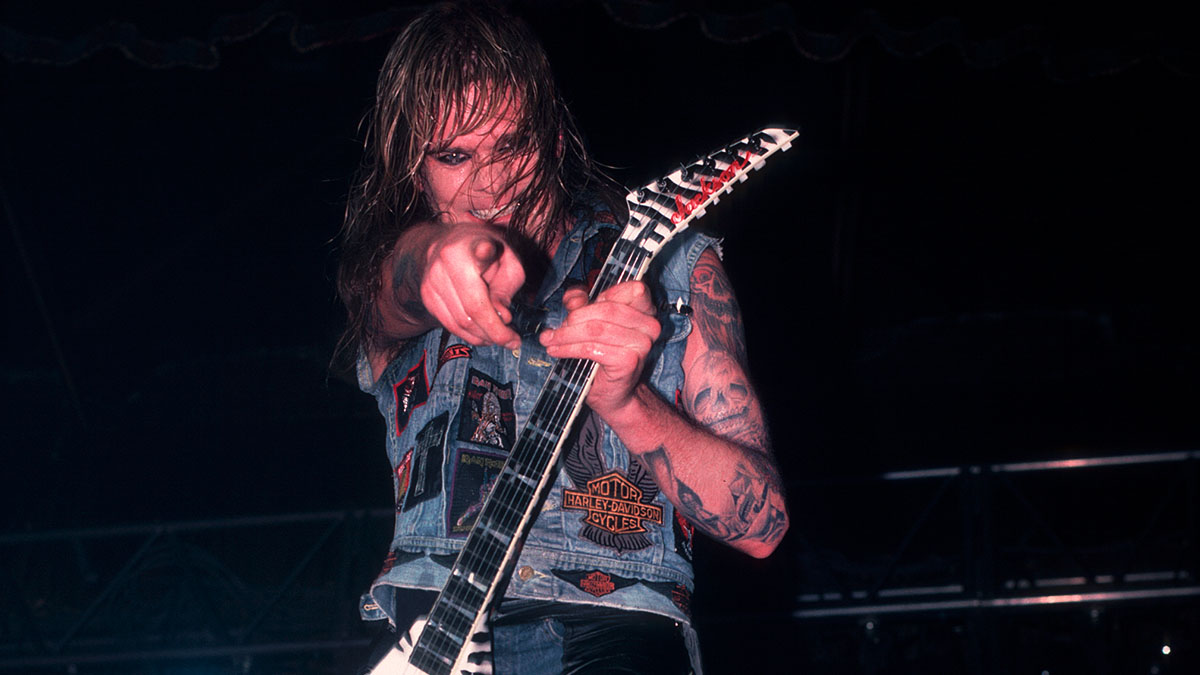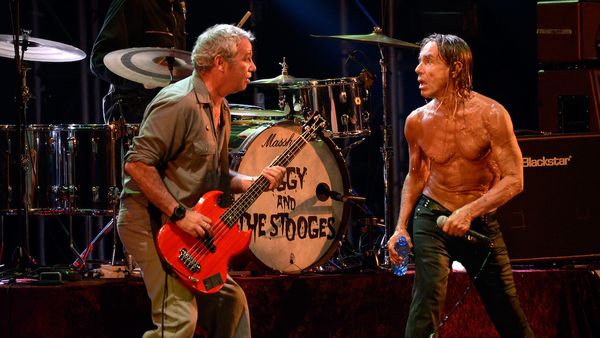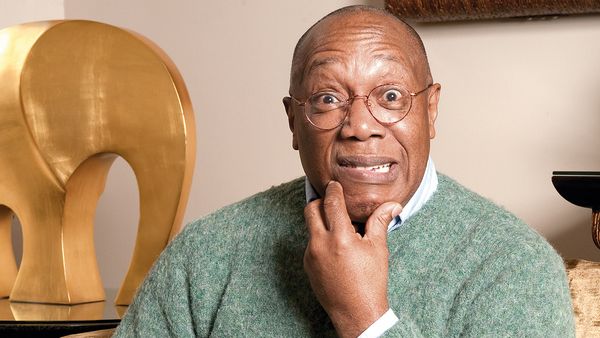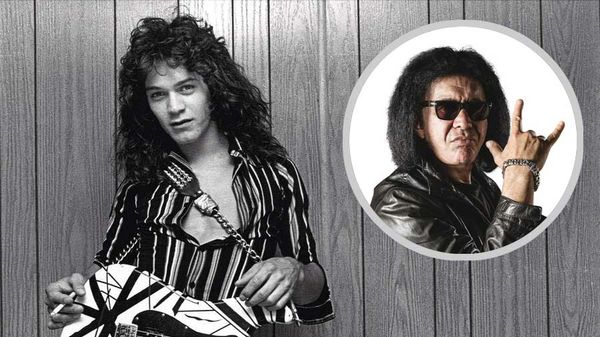
Among the many memorable (and in some cases, unintentionally hilarious) depictions of rock ’n’ roll hedonism featured in Penelope Spheeris’ 1988 documentary, The Decline of Western Civilization Part II: The Metal Years, one scene in particular became something of an instant classic.
It’s a night time sequence in which an extremely inebriated Chris Holmes, then the wild and wooly lead guitarist for the notorious shock metal band W.A.S.P., lazes about in a chair float in a swimming pool and chugs freely from a bottle of vodka.
“I’m a full-blown alcoholic,” he says matter-of-factly to the off-screen Spheeris. He seems sadly self-aware of his own absurdity, yet oddly defiant as he unconvincingly claims, “I’m a happy camper.”
Throughout the interview, Holmes’ words become more unintelligible, and his mood grows darker (he states that he’s already had something like five pints of booze that day). Finally, he produces a fresh bottle of vodka, unscrews it and power-chugs roughly half of it before pouring what’s left over his head. It’s as if he’s out to prove some sort of point. But what?
Making the scene all the more surreal – and tragic – is the presence of the guitarist’s mother, who sits silently by the pool, her face frozen in a mysterious, inscrutable expression.
It’s a moment in rock movie infamy that has dogged Holmes over the years. Reflecting on the scene now, the guitarist heaves a sigh and says, “People started looking at me like I was a drunk. You go on the internet and that’s all you see – I’m the drunk guy in the pool.
“The funny thing is, some people think that scene was faked, which is crazy. I never faked anything in my life. Yeah, I was hammered in the pool, but so what? That’s the way I lived my life at the time. I’m a lot different now.”
That he is. Sober for the past 26 years, Holmes now leads a quieter and quainter life in Cannes, France, with his French-born wife and manager, Catherine, whom he married in 2012. He quit W.A.S.P. not once, but twice (his final departure was in 2001, and it seems permanent) and has been through several bands before deciding to front his own group, Mean Man, in 2015.
With his deep, gravelly voice, gray mustache and goatee, and a general world-weary countenance, the 64-year-old guitarist could easily be mistaken for a grizzled biker. He insists he feels right at home in France. “Things are better for me here,” he says. “We’ve got a dog and a couple of chickens. I never thought I would wind up in this place, but it’s good.”
Musically, Holmes has found a more receptive audience for his brand of high-velocity metal in France. “The younger kids here still listen to rock – there isn’t so much hip-hop,” he says. “In the South of France, they’re into that, but in most of the country and in Europe, they listen to rock.”
He stresses that the idea of returning to the US, and specifically Los Angeles, is unthinkable. “L.A. was great when it was great, but now it sucks,” he says. “The metal scene isn’t there anymore. The clubs are mostly gone. There’s no more House of Blues. The Key Club was sold to Beyoncé, and I doubt she’ll have Deep Purple playing there.
“I guess big bands like Metallica can still do their thing, but it would be impossible for me to get a band up and running anymore. I know there’s still thousands of musicians in L.A., but from where I stand, things just went downhill.”
Leading up to the Covid pandemic, things appeared to be on the upswing for Holmes. His band was gigging regularly throughout Europe, and he attempted to reset his public image via a documentary film, Mean Man, which detailed his post-W.A.S.P. life.
In early 2022, however, he was diagnosed with throat cancer and was forced to put his career on hold. “I don’t know if it was surprising,” he said. “I smoked all my life – not just cigarettes, but everything under the sun. I drank for a long time. There was no cancer in my family, so I guess it was self-induced. People might say, ‘Yeah, sure, he partied and drank all the time.’” He laughs. “Put it this way: I had a good time.”
After undergoing rigorous treatment, Holmes was recently given the news that his throat was free of cancer and that there was no metastasis. Even so, he doesn’t yet feel 100 percent. “I’m still suffering from the radiation that went through my neck,” he says. “My saliva is like Super Glue. But I’m hoping I can get back to playing shows in a little while. I tried singing the other day, but I didn’t have the stamina I need to do a gig. I’ll just have to keep at it. I have to sit down and keep singing. It’ll come back.”
W.A.S.P. were a pretty big band during the '80s, but people don’t seem to mention you when they rank notable guitarists from the metal scene. Do you feel unappreciated or overlooked?
“I’m overlooked, sure. I don’t play with W.A.S.P. anymore, so a lot of people forgot about me. That movie, Decline of Western Civilization, didn’t help. The other thing is, when I was in W.A.S.P., I was never allowed to do any interviews with guitar magazines. [Rhythm guitarist/frontman] Blackie [Lawless] wouldn’t let me. Writers would ask management to talk to me, and they were told I had ‘other obligations’ – shitty things like that. I don’t know if that was done to keep me down so Blackie could stay up. Who knows? Shit like that was always going on.”
I couldn’t read music. Actually, I’ll tell you, I have dyslexia. I’ve never read an entire book during my whole life
What got you into playing guitar? Who were your big influences?
“When I was about 12 or 13, I saw the Jimi Hendrix movie, and that got me into playing the guitar. I thought, 'What a job – I wanna do that!' My older brother took me to concerts. I saw Johnny Winter and was blown away. At the time, he played rock. He played good, good, hard rock. He’s mostly known for blues, but what turned me on was when he played rock. Brownsville Station – I saw them open for Johnny Winter, and they kicked ass. I saw things like that.
“I couldn’t read music. Actually, I’ll tell you, I have dyslexia. I’ve never read an entire book during my whole life. Reading music was impossible. Anything I’ve done was by ear. If you do it enough, you’ll get it.”
Before W.A.S.P., you were in a few bands – Buster Savage, LAX and Slave. What were they like?
“This was back in ’74, ’75. We played some covers – Ziggy Stardust, Black Sabbath, Zeppelin. I enjoyed writing our own music. We played hard stuff. They were good groups. I don’t have any tapes of them, but I thought they were good.”
What was the guitar scene like in L.A. during the early '80s? Were guys trying to be the hottest and fastest? How did you fit in – or didn’t you?
“I tried to play fast, but I can only play what I play. I just tried to be myself. The scene was flooded with guitarists, and the competition was unbelievable. It was nuts. I was into playing lead, but I was more into tone. I had the opportunity of growing up around Van Halen, and from that I learned a lot about Marshalls and how to dial in the sounds. In those days, we didn’t even have preamps.”
You were pretty friendly with Eddie Van Halen. The story goes that he used your Ibanez Destroyer on Women and Children First.
“He used it on the record, yeah. He gave me the guitar that’s on the album cover – we switched guitars. He was one of the coolest musicians, an unbelievable player. He had a knack for taking the best from anybody he ever listened to and combined them – Billy Gibbons, Eric Clapton, you name them – and he made it look so easy. He blew my mind.”
When did you start playing Jackson guitars?
“Probably about ’83. [Rhythm guitarist] Randy [Piper] and Blackie wanted to play B.C. Rich guitars, and I wanted Jacksons. They have a longer scale. Blackie was like, ‘I’ll get you a deal.’ We went out to the Jackson shop in San Dimas, and Grover Jackson told Blackie to get screwed. I was kind of bummed about that.
“About four months later, we were about to do this movie called The Dungeonmaster. I called Grover and said, ‘Hey, this is Chris, the guy from W.A.S.P. If I were to use one of your guitars in this movie, could I get one made?’ And he said, ‘Now you’re talking. You’re promoting my product.’
“He brought a guitar down and watched us do the movie. Then he said to come down to the shop, and he made me a guitar. I never signed a contract, but they treated me well. They made me whatever I wanted, but I never asked for more than I needed.”
Musically, what was appealing to you about W.A.S.P.?
“I had played in a band with Blackie called Sister, probably around ’78 or ’79. I left them, but I don’t know why – probably because of the way I was treated. Then in ’82 he called me. He said, ‘Chris, I’ve got this band, but it’s not going to work unless you’re in it.’ I said, ‘If it’s like Sister, count me out. I’m not into that glam shit.’ But he said, ‘This is right up your alley. You can dress in leather, whatever you want.’
I liked W.A.S.P. I didn’t look at it like ‘We are Satan’s people.’ I looked at it like ‘We are stupid people’
“I had just gotten out of jail for a DUI and was supposed to go back to work. I had collected unemployment while I was in the clink. I went back to live with my mom, but I knew I couldn’t work and do the band at the same time. So I told Blackie, 'I’ll do the band as long as I can play the way I play, and nothing’s going to stop me.' Musically, I put my influence on it.”
W.A.S.P. were known for their outrageous stage show. Did you sometimes think the theatrics got in the way of the music?
“No. No, no, no. All bands are about theatrics. Look at the record covers – they all say something. I liked W.A.S.P. I didn’t look at it like ‘We are Satan’s people.’ I looked at it like ‘We are stupid people.’ [Laughs] No, I just looked at it as a group. We had a lot of energy coming off that stage.”
Part of Blackie’s shtick was throwing raw meat out at the crowd. Did any of that meat ever get in your electric guitars?
“No, but one time some of it ended up in the back of one of my amps. We went to rehearse about three weeks later. We pulled the amp out of a garage where we stored it, and when we looked in the back of it we saw all of these maggots in the meat. [Laughs]”
Whoa, that sounds rugged!
“Yeah, it was pretty gross. The meat had gotten all rotten and stuff, so it smelled. One time during a gig, Blackie took the big meat box and threw it to the side of the stage; it bounced off a wall and hit me in the temple – knocked me out cold.”
Did people in the audience mind getting meat thrown at them?
“There was nothing they could do. The places were packed, so you basically took your chances. It was intense. I used to tell Blackie, ‘People can tell which way you’re gonna throw it. You have to point one way and then throw the meat the other way. You’ll be able to nail people.’ He tried it and said, 'This is way better. People aren’t expecting it.’” [Laughs]
You quit W.A.S.P. for a time, then rejoined. Then you quit again and never went back. Any regrets?
“No. The only regret I have is that I wish I would have known how the business works in terms of publishing. I was never told about any of that. When records were done, nobody said, ‘Chris, we have a meeting to split up the publishing.’
“Randy didn’t write, [drummer] Tony [Richards] didn’t write, and so the only person they had to keep out of that was me. It wasn’t until I got a little older that I found out the stuff that was going on behind my back. That’s the way it is. I can’t change the past; I can only worry about the future.
“Actually, the other regret I have is that I should have bitched about the second album. When Blackie said, ‘It’s gonna be me on the cover,’ I should have said, ‘Well, if it’s gonna be you, then I should leave.’ Because it’s not a band at that point – which it wasn’t. But I still stayed like an idiot and did whatever. I didn’t even want to play on the third album. I just went in and did my thing, and I was gone. We weren’t even friends at that point.”
Did seeing yourself in that scene in Decline of Western Civilization serve as a wakeup call for you to stop drinking?
“I didn’t quit because of that. Hell no! [Laughs] I didn’t quit drinking till ’96. I got a DUI, like, my fifth one. I went to a program, and I listened to what they said. A counselor told me I had to quit drinking, and I said, ‘You’re nuts.’ Then he said, ‘One year. If you can quit for one year, you’ll never drink again.’
“I told him he was crazy, but he said, ‘Think of it this way: You can always go back to it.’ So I thought, ‘Okay, one year – I can do that.’ After I quit drinking for one year, I saw the incredibly stupid things people do when they’re drunk. It blew my mind.”
There’s a lot of stuff I wrote from my heart on those albums, but I didn’t get written in for it. I’d be screwing myself if I went and played with him
Some years ago, you started fronting your own band. Were you nervous at first being the lead singer?
“I don’t claim to have the best voice. I don’t have the highest range. The first time I ever went out and sang on my own, it was hard. I wasn’t very sure about my voice. The second time, I did a show here in France and it was totally different. I felt really confident. I got to the point where I was like, ‘I don’t care if people don’t like my voice. They can walk out and do whatever they want.’"
Do you think you play better sober than during your party days?
“No. When I was in W.A.S.P., I never drank before I played. I was always sober on stage. Actually, I only drank one time – it was at the Troubadour. The show took twice the amount of work, and when I got off the stage I was almost dead. I hit the ground and said, ‘I will never, ever do that again!’ I would drink at night and get on stage with a hangover – oh yeah. But from the time I woke up and during the day of the show, I never drank. I’ve heard people say, ‘Man, he had four beers with me before he played.’ They’re full of shit.”
Let’s say you got a phone call from Blackie today, and he says he wants to do a full reunion of the band from back in the day. Would you do it?
“I’d say, ‘You have to pay me the publishing for what I wrote. Then I’d be more than happy to do it. Other than that, I won’t do it.’ There’s a lot of stuff I wrote from my heart on those albums, but I didn’t get written in for it. I’d be screwing myself if I went and played with him. Why do it? If somebody beats you up, why would you want to go see them again? It’s not worth it.”
- Mean Man: The Story of Chris Holmes is streaming on Prime.










